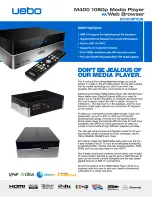
9
3.4 Playable disc formats
The CD3.2 / 5.2 can play all compact discs which are recorded according to the red book standard (means
the standards for audio CDs established by PHILIPS and SONY). Furthermore all CDRs and CDR/Ws with
good reflection recorded according to this standard are playable. Most copy protected discs are also
playable. But we cannot take responsibility that all future copy protection systems are playable.
3.5 Playing CDs (play, pause, stop, skip, search)
If a disc is inside playing is started by pressing the play button (12). If You press PAUSE (11) the CD3.2 / 5.2
will go into the pause mode until PLAY (12) or STOP (10) is pressed.
Using the skip buttons (13, 14) You can easily access any title on the disc. When You press one of the skip
buttons for longer than a second while the unit is playing, it begins to play in fast forward or reverse mode.
The actual state (PLAY, PAUSE, STOP) is shown in the display (8). Furthermore the display shows the
actual playing time, the actual title number and the total number of titles.
3.6 Repeat
Press the repeat button (6) once to repeat the actual title, twice to repeat the whole CD or the programmed
sequence. A third pressing returns to the normal playing mode. The repeat state is displayed in the upper
line of the display (8).
3.7 Programming an individual playlist
If a disc is inside the player You can program Your individual playing sequence as follows: Tip on the button
program (4) to enter the playlist-menu.
•
Pressing STOP (10) exits the menu and the CD3.2 / 5.2 will return to normal mode.
•
Pressing PAUSE (11) generates a random playlist.
•
Pressing PLAY (12) leads you to the programming menu.
The display shows on the left side the actual title ("TRCK"), below the playing time of this title ("TIME").
Pressing the buttons
< or >
(2, 3) selects a title.
Pressing PLAY (12) adds the selected title to the playlist. The display shows on the right side the number of
programmed titles ("PGM-QTY"), below the playing time of the programmed list ("P-TIME").
The button PROG (4) stores the playlist, if you want to exit without storing, press STOP (10).
NOTE:
The maximum number of programmed tracks is 99, the maximum program duration is 99 minutes.
EXAMPLE:
The CD inside the player contains 15 titles. You want to play only titles 7, 3 and 8.
•
Press PROG (4) and the PLAY (12). The display now shows “TRCK 1/15”.
•
Select title 7 using the buttons < or >
(2, 3). Display shows “TRCK 7/15”.
•
Now add this track (pressing PLAY (12)) to the playlist.
•
Select title 3 using the buttons < or >
(2, 3). Display shows “TRCK 3/15”.
•
Now add this track (pressing PLAY (12)) to the playlist.
•
Select title 8 using the buttons < or >
(2, 3). Display shows “TRCK 8/15”.
•
Now add this track (pressing PLAY (12)) to the playlist.
•
Now press PROG (4) to finish the programming and store the playlist.
Deleting an existing playlist
Press PROG (4) and after that STOP (10). and the playlist is deleted.
































